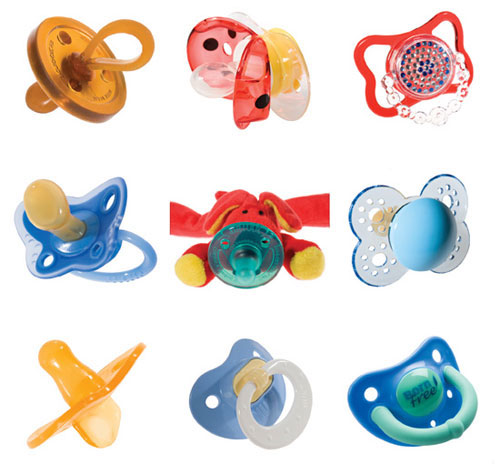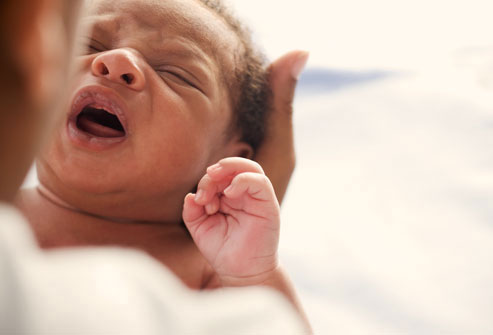Pacifiers are very handy in pacifying a crying baby. A pacifier stops a baby from crying by giving her a feeling of comfort. Pacifiers can be used as a preventive measure for thumb sucking. Read here to know everything about pacifiers.Sometimes sticking a pacifier into a babys mouth has the same effect as waving a magic wand that makes your wish come true. In this case, the baby stops crying. This miraculous object has a deceptively simple appearance. A pacifier is a nipple without a hole that is attached to a plastic disk. The disk prevents the baby from accidentally swallowing the nipple. It is not very clear how exactly a pacifier stops a mildly irritated baby from bawling. Either the act of sucking is a comfort in itself or the pacifier just keeps the babys mouth occupied. In this articleSucking a pacifier vs. thumb-suckingParents who have starting troubleParents who cant seem to stopThe pacifier as a preventive measure against thumb-suckingNo restrictionsPhasing out the pacifierPacifier care Sucking a pacifier vs. thumb-sucking Parent share similar fears about thumb-sucking and the use of pacifiers to soothe babies. They are apprehensive that sucking the pacifier or a thumb may develop into a nasty little habit. According to Dr. Spock, pacifiers are the lesser of the two evils. He has observed that babies who use pacifiers without restriction in the first few months rarely become thumb-suckers, even if they give up the pacifier in 3 or 4 months. In addition, it has been observed that babies who develop a habit of sucking a pacifier voluntarily shun the pacifier after three or four months. The same object that they have been sucking blissfully for months is rejected. A three-month old baby will probably spit out a pacifier without any coaxing. At the latest, a child will give up the pacifier when she is one or two years old. On the other hand, babies who become thumb-suckers in the first three months continue to suck their thumbs until they are three, four, or even five years of age - sometimes even longer. Another disadvantage of thumb-sucking is that it has a tendency to push the babys teeth out. Parents who have starting trouble All parents envision laughing, gurgling, babbling, smiling, even crying babies. However, a baby with a pacifier in her mouth spoils the picture. A pacifier somehow seems to put your baby on hold. The baby with a pacifier in her mouth somehow seems to lose her personality, like watching television with the mute button on. This is the reason that some parents express reluctance to calm their babies with pacifiers even when the doctors indicate that there is no harm. The problem occurs when these parents change their minds after a few weeks and offer the pacifier to the baby. It may be too late and she may not be willing to accept this object of comfort any longer. Parents who cant seem to stop Some parents, noting the effectiveness of a pacifier in calming a fretful or colicky baby, have a tendency to use pacifiers for their convenience rather than the babys. Believe it or not, life does go on after the arrival of a baby. For parents rushing around trying to do a hundred things at the same time, it can be quite a nuisance to drop everything to comfort a whimpering baby. Sometimes it is so much easier to pop the pacifier into your babys mouth and have her entertain herself. However, the problem begins when this becomes a habit with the parents even after the baby is ready to give up the pacifier by the time she is three or four months old. Continued use of the pacifier even after this point could result in the baby perceiving the pacifier as a source of comfort rather than something that assuages her need to suck. In these circumstances, the baby may not be willing to give up the habit till she is almost a year and a half old. The pacifier as a preventive measure against thumb-sucking Parents should try to pre-empt thumb-sucking by giving their baby a pacifier in the first few days or weeks of life. The idea is to get her used to the pacifier before she becomes accustomed to and enjoys the sensation of sucking her thumb. No restrictions Whenever parents notice the baby reaching out for something to suck, they should pop the pacifier in her mouth. Initially, babies are awake only before or after feeds. In all likelihood you will only need the pacifier at these times. However, do not hesitate to use the pacifier freely in the first three months of the babys life. The aim is that the baby be given every opportunity to suck so that she gets it out of her system by the time she is three months old. Phasing out the pacifier Removing a pacifier is not as easy as popping it in the babys mouth. Most babies protest vigorously. The best time to remove the pacifier is when the baby is feeling drowsy or has just fallen asleep. Babies who become accustomed to falling asleep with a pacifier can ruin their parents sleep. This is because when the pacifier falls out, the distressed baby begins to wail lustily and will persist till you replace the pacifier. In normal circumstances, most babies decide on their own that the days of the pacifier are over. They usually indicate that they have outgrown the pacifier by spitting it out when it is offered to them. However, this does not mean that she is willing to give up the pacifier overnight. She may feel the need for it on days when she particularly needs comforting. You can resume your attempts to decrease the use of the pacifier when she seems willing again. Pacifier care Remember to wash the pacifier with soap when you first get it. You dont need to keep washing it unless it falls on the floor, because the only place its been is the babys mouth. Old nipples can crumble when babies chew on them. Remember to replace crumbling pacifiers. This article is based on the views of Dr. Spock.
Pacifiers are very handy in pacifying a crying baby. A pacifier stops a baby from crying by giving her a feeling of comfort. Pacifiers can be used as a preventive measure for thumb sucking. Read here to know everything about pacifiers.Sometimes sticking a pacifier into a baby's mouth has the same effect as waving a magic wand that makes your wish come true. In this case, the baby stops crying. This miraculous object has a deceptively simple appearance. A pacifier is a nipple without a hole that is attached to a plastic disk. The disk prevents the baby from accidentally swallowing the nipple. It is not very clear how exactly a pacifier stops a mildly irritated baby from bawling. Either the act of sucking is a comfort in itself or the pacifier just keeps the baby's mouth occupied.
Sucking a pacifier vs. thumb-sucking
Parent share similar fears about thumb-sucking and the use of pacifiers to soothe babies. They are apprehensive that sucking the pacifier or a thumb may develop into a nasty little habit. According to Dr. Spock, pacifiers are the lesser of the two evils. He has observed that babies who use pacifiers without restriction in the first few months rarely become thumb-suckers, even if they give up the pacifier in 3 or 4 months. In addition, it has been observed that babies who develop a habit of sucking a pacifier voluntarily shun the pacifier after three or four months. The same object that they have been sucking blissfully for months is rejected. A three-month old baby will probably spit out a pacifier without any coaxing. At the latest, a child will give up the pacifier when she is one or two years old. On the other hand, babies who become thumb-suckers in the first three months continue to suck their thumbs until they are three, four, or even five years of age - sometimes even longer. Another disadvantage of thumb-sucking is that it has a tendency to push the baby's teeth out.
Parents who have starting trouble
All parents envision laughing, gurgling, babbling, smiling, even crying babies. However, a baby with a pacifier in her mouth spoils the picture. A pacifier somehow seems to put your baby on hold. The baby with a pacifier in her mouth somehow seems to lose her personality, like watching television with the mute button on. This is the reason that some parents express reluctance to calm their babies with pacifiers even when the doctors indicate that there is no harm. The problem occurs when these parents change their minds after a few weeks and offer the pacifier to the baby. It may be too late and she may not be willing to accept this object of comfort any longer.
Parents who can't seem to stop
Some parents, noting the effectiveness of a pacifier in calming a fretful or colicky baby, have a tendency to use pacifiers for their convenience rather than the baby's. Believe it or not, life does go on after the arrival of a baby. For parents rushing around trying to do a hundred things at the same time, it can be quite a nuisance to drop everything to comfort a whimpering baby. Sometimes it is so much easier to pop the pacifier into your baby's mouth and have her entertain herself. However, the problem begins when this becomes a habit with the parents even after the baby is ready to give up the pacifier by the time she is three or four months old. Continued use of the pacifier even after this point could result in the baby perceiving the pacifier as a source of comfort rather than something that assuages her need to suck. In these circumstances, the baby may not be willing to give up the habit till she is almost a year and a half old.
The pacifier as a preventive measure against thumb-sucking
Parents should try to pre-empt thumb-sucking by giving their baby a pacifier in the first few days or weeks of life. The idea is to get her used to the pacifier before she becomes accustomed to and enjoys the sensation of sucking her thumb.
No restrictions
Whenever parents notice the baby reaching out for something to suck, they should pop the pacifier in her mouth. Initially, babies are awake only before or after feeds. In all likelihood you will only need the pacifier at these times. However, do not hesitate to use the pacifier freely in the first three months of the baby's life. The aim is that the baby be given every opportunity to suck so that she gets it out of her system by the time she is three months old.
Phasing out the pacifier
Removing a pacifier is not as easy as popping it in the baby's mouth. Most babies protest vigorously. The best time to remove the pacifier is when the baby is feeling drowsy or has just fallen asleep. Babies who become accustomed to falling asleep with a pacifier can ruin their parents sleep. This is because when the pacifier falls out, the distressed baby begins to wail lustily and will persist till you replace the pacifier.
In normal circumstances, most babies decide on their own that the days of the pacifier are over. They usually indicate that they have outgrown the pacifier by spitting it out when it is offered to them. However, this does not mean that she is willing to give up the pacifier overnight. She may feel the need for it on days when she particularly needs comforting. You can resume your attempts to decrease the use of the pacifier when she seems willing again.
Pacifier care
Remember to wash the pacifier with soap when you first get it. You don't need to keep washing it unless it falls on the floor, because the only place it's been is the baby's mouth. Old nipples can crumble when babies chew on them. Remember to replace crumbling pacifiers.
This article is based on the views of Dr. Spock.































